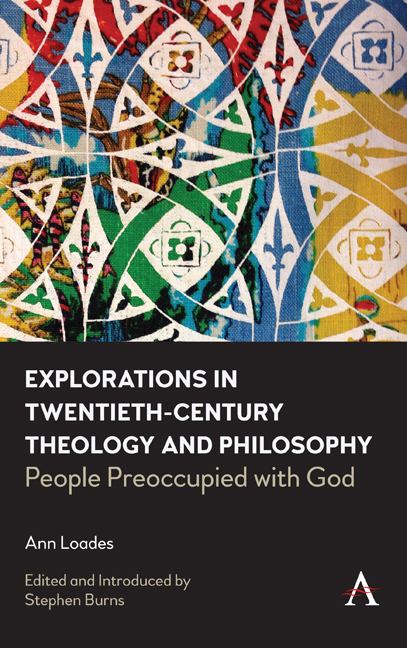Book contents
- Frontmatter
- Contents
- A Personal Note
- Foreword
- Introduction: The Grace of Intelligence
- Chapter One Evelyn Underhill (1875–1941): Mysticism and Worship
- Chapter Two Evelyn Underhill: As Novelist – Exploring Mysticism
- Chapter Three Dorothy L. Sayers (1893–1957): War and Redemption
- Chapter Four Dorothy L. Sayers: Are Women Human? Considering Dante’s Beatrice
- Chapter Five C. S. Lewis (1898–1963): On Gender
- Chapter Six C. S. Lewis: On Grief
- Chapter Seven Austin Farrer (1905–1968): Love Almighty and Ills Unlimited
- Chapter Eight Austin Farrer: And Friends
- Chapter Nine Simone Weil (1909–1943): Resistance and Writing
- Chapter Ten Simone Weil: Eucharistic Sacrifice – Exploring a Metaphor
- Chapter Eleven Stephen Sykes (1939–2014) and Colleagues: Exploring the Problematic Legacy of Power
- Afterword: The Passionate Intellect of Ann Loades
- Acknowledgements
- Bibliography
- Contributors
- Index
Afterword: The Passionate Intellect of Ann Loades
Published online by Cambridge University Press: 18 November 2023
- Frontmatter
- Contents
- A Personal Note
- Foreword
- Introduction: The Grace of Intelligence
- Chapter One Evelyn Underhill (1875–1941): Mysticism and Worship
- Chapter Two Evelyn Underhill: As Novelist – Exploring Mysticism
- Chapter Three Dorothy L. Sayers (1893–1957): War and Redemption
- Chapter Four Dorothy L. Sayers: Are Women Human? Considering Dante’s Beatrice
- Chapter Five C. S. Lewis (1898–1963): On Gender
- Chapter Six C. S. Lewis: On Grief
- Chapter Seven Austin Farrer (1905–1968): Love Almighty and Ills Unlimited
- Chapter Eight Austin Farrer: And Friends
- Chapter Nine Simone Weil (1909–1943): Resistance and Writing
- Chapter Ten Simone Weil: Eucharistic Sacrifice – Exploring a Metaphor
- Chapter Eleven Stephen Sykes (1939–2014) and Colleagues: Exploring the Problematic Legacy of Power
- Afterword: The Passionate Intellect of Ann Loades
- Acknowledgements
- Bibliography
- Contributors
- Index
Summary
Ann Loades was a gracious human being of enormous intellectual, moral and personal energy, exemplifying the Dantean ‘passionate intellect’ both described and endorsed by Dorothy Sayers. Whilst widely read in many academic and non-academic literatures, in addition to her scholarly expertise in philosophy and theology she was a great lover of novels and music and dance and theatre and opera and art and good food (often prepared skillfully by her). She was deeply rooted in the historic cultures of Great Britain but possesses a profoundly cosmopolitan sensibility that takes in Europe and North America as well. Perhaps more than anyone else, I think that Ann Loades – along with her Durham and St Andrews colleague David Brown – presented me with a vision of the Christian faith that was also integrated convincingly with what could most plausibly be called ‘the real world’ That is, as Austin Farrer put it about God's action in the created order, the shared theological vision here was not made by ‘faking the story or defying probability at any point’ but rather emerged organically from the genuine realities under consideration. For Ann, neither side of the ‘faith’/‘world’ equation overdetermines the result, but both are allowed to retain their full integrity. Some may regard this balance with suspicion as leading inevitably to a form of lukewarm or watered down ‘latitudinarianism’, but while Ann is entirely open to and indeed insists upon the rational, moral and imaginative interrogation of the Christian tradition, her general perspective remains that of a distinctly ‘Catholic’ Anglican with yet a great appreciation of ecumenical diversity and the need to learn from outside the bounds of orthodoxy.
As Stephen Burns's introduction aptly indicates, Ann was one of the first British theologians to articulate and defend an explicitly feminist perspective, and her groundbreaking work here deserves continuing attention. I would not want to saddle Ann with the now controversial and in some circles pejorative term ‘second-wave feminist’, but she was nevertheless someone keenly, indeed painfully, aware that the social concerns of that earlier phase of feminism remain unresolved and therefore it is a mistake to ‘move on’ to other perhaps equally valid and pressing issues without continuing to draw urgent attention to these earlier ones as well. She was, for example, closely attuned to the material conditions of human life and especially their tragic deprivation in certain sectors.
- Type
- Chapter
- Information
- Explorations in Twentieth-Century Theology and PhilosophyPeople Preoccupied with God, pp. 215 - 218Publisher: Anthem PressPrint publication year: 2023

